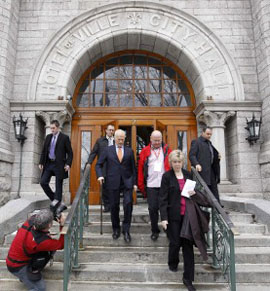Quebec’s new man in Ottawa has a very big job .. and you do have to wonder – is he up to it?
May 30th, 2011 | By Counterweights Editors | Category: Key Current IssuesThe 41st Parliament of Canada has not even held its first meeting quite yet. But already Jack Layton’s new Quebec-majority NDP official opposition is showing just how different it is from anything the federal New Democrats have ever known before.
Former Ontario NDP leader Stephen Lewis, son of former federal leader David Lewis (silent partner of Pierre Trudeau’s 1972—1974 “Liberal-NDP” minority government), has declared: “My father used to say to me, ‘Victory won’t happen in my time’ …Â “And I used to say to my children, ‘It won’t happen in my time.’ But now I think it’s possible. I’m 73, but I hope I can hang on, because I think Jack can win.”
This may or may not prove correct. But if it does, Jack’s ability to serve as gifted midwife in the rebirth of a fresh and more realistic mainstream Quebec federalism for the 21st century will have played a big role. And if Mr. Layton is going to demonstrate such ability, he will have to show a lot more of two key qualities than he has so far. (Granting that it is still far too early to rush to any definitive judgments, of course.)
The first is just raw courage, of a sort typically in short supply among Canadian politicians. The second is some well-thought-out concept of what a fresh and more realistic mainstream Quebec federalism for the 21st century will have to be – to both strengthen the Canadian future, and sell inside and outside Quebec!

New Democratic Party leader Jack Layton raises a glass of beer during a campaign stop at a sports bar in Montreal, April 14, 2011. (REUTERS/Shaun Best).
Take two issues that have already popped up. The first is “whether the NDP Leader believes the support of 50 per cent plus one in a referendum on sovereignty would be enough for Quebec to separate from Canada.” The second is the question of Quebec’s representation in a slightly reformed Canadian House of Commons, designed to bring the representation of the three most rapidly growing provinces of BC, Alberta, and Ontario more into line with the ancient democratic principle of representation by population.
It may be that Jack Layton has already displayed a little unusual courage on both issues. But he has also shown how neither he nor his party as yet have any even plausible ideas of fresh beginnings on the road ahead, in either case. All the “Jack of Hearts” has done so far is underline just how tough his new job is going to be.
1. “50 % + 1: Layton rajuste le tir” …
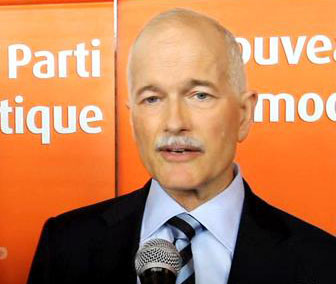
NDP Leader Jack Layton clarifies his party's position on conditions for the separation of Quebec from Canada at the NDP Quebec Section General Council at Montreal May 28, 2011.
If anything, the Quebec contingent of the Parliamentary Press Gallery in Ottawa seems to have even less idea than Jack Layton himself about how to deal with the new reality of the NDP’s now 59 Quebec seats (more than 78% of Quebec’s total of 75 federal seats). Last week’s quite artificial controversy over whether the support of 50% + 1 in a referendum on sovereignty would be enough for Quebec to separate from Canada is a case in point.
The Globe and Mail described how it all got started in a report first posted very late on the evening of Tuesday, May 24: “Comments from some of the new Quebec MPs suggest they may still be open to … an independent Quebec. Managing this political land mine will be an ongoing issue … Journalists reporting for Quebec … make up a large chunk of the Parliamentary Press Gallery. Their questions on Tuesday were almost singularly focused on whether the NDP Leader believes the support of 50 per cent plus one in a referendum on sovereignty would be enough for Quebec to separate from Canada. A 2005 NDP policy paper called the Sherbrooke Declaration states that the party would recognize such a result. Asked … to repeat that, Mr. Layton would say only that it remains party policy but that the Supreme Court’s position on the issue – which does not give a minimum number – is a better guide.”
The apparent ambiguity of this initial answer was not well received by either Quebec provincial politicians or a number of Jack Layton’s freshly minted federal New Democrat MPs from Quebec. As reported by the CBC: “All three Quebec [provincial] political parties were quick to denounce the comments Wednesday, declaring in a uniform voice that Quebec has the right to set its own conditions for a referendum.”
Still more importantly (no doubt), as reported by Le Devoir on Wednesday: “Selon Guy Caron (Rimouski-Neigette), la déclaration adoptée par le NPD à Sherbrooke en 2005 entérinant la règle du 50 % +1 n’est pas compatible avec la Loi de clarification, dite la loi sur la clarté référendaire, de Stéphane Dion adoptée par le gouvernement libéral en 2000 [taking the Supreme Court’s position a little further still]. «Pour nous, c’est deux choses différentes. Ce qu’on a comme position pour le parti, c’est la déclaration de Sherbrooke et c’est ce qu’on va mettre de l’avant.»”
By Thursday Mr. Layton himself had qualified his initial ambiguity and come down more squarely on the side of M. Caron and other Quebec New Democrats. The Globe and Mail was reporting: “It’s official: Layton backs 50%-plus-one rule for Quebec secession.” And according to Le Devoir: “50 % + 1: Layton rajuste le tir … «Ce qui constitue une majorité, c’est 50 % + 1», a déclaré M. Layton en conférence de presse hier, alors qu’il présentait son cabinet fantôme. «C’est clair comme de l’eau de roche que c’est la politique de notre parti depuis cinq ans.»”
The federal NDP leader looked like he was having some trouble here – because he was. Neither he nor his party have had to think seriously about these kinds of issues in the past. It will take a while for them to catch up. At the same time, it is also arguable, we think, that little harm has been done to the larger cause of the Canadian future. More than 40 years and two referendums (on ambiguous questions) have now elapsed since René Lévesque established the Parti Québécois. For growing numbers of us in the rest of Canada outside Quebec at any rate, a few things are much clearer than they used to be. And we think Jack Layton himself is showing some promise when he “says attitudes have changed a lot in the past three decades and people are tired of old debates that pit Quebec against Canada.”
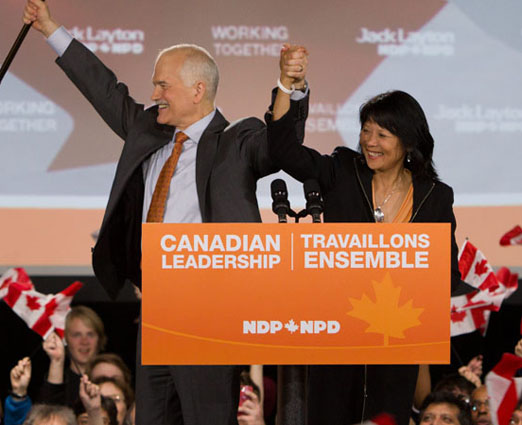
New Democratic Party leader Jack Layton and wife Olivia Chow celebrate their victories at NDP headquarters in Toronto, Ont., Monday, May 2, 2011. (Darren Calabrese / THE CANADIAN PRESS).
Of course, “Quebec has the right to set its own conditions for a referendum” on the future of Quebec. But neither in principle nor practice can it determine how the rest of the country would react to any serious attempt by Quebec to actually “separate from Canada.” Having followed this issue closely for more than 40 years (whether we wanted to or not), it is now very clear to us that Canada without Quebec is simply impossible – geographically just for starters. If Quebec ever really were to “separate” from Canada, Canada would be destroyed..
From this standpoint, the question of whether 50% + 1 or some more demanding formula would be required for Quebec to “separate” from Canada is academic at best. If things ever do get this bad, under whatever formula, it will be game over for everyone who lives in Canada now. We will all have to find new homes.
Outside Quebec anger and apathy will be the main emotions in the air. There will be no wise and gentle negotiations about anything – and it is sheer political fantasy to imagine there could be. Quebec will not be able to negotiate with Canada, because Canada will no longer exist.

Campaigning in Quebec City, with the everyday French he learned on the streets of Montreal (and/or Hudson, Quebec), April 2011.
We will leave this argument here for the moment. Though we note as well in closing our colleague Randall White’s counterweights article of just over a year ago now: “Who’s afraid of Pauline Marois : or why does Québec still have more people who call themselves Canadian than any other province in Canada?”
We also feel that Alexandre Blanchet’s most welcome comment of qualification on this article from this past March is very interesting, But we don’t find it quite convincing in the end. Our exact reasons we will put off for another time as well. (While just noting quickly that the 59 Quebec seats in the Canadian House of Commons won by Jack Layton’s New Democrats this past May 2 arguably lend some vague support to Dr. White’s original argument, as such things look in the rest of Canada outside Quebec, at any rate!)
What M. Blanchet’s comment does show without doubt, we think – like the views of Guy Caron and other new Quebec New Democrat MPs whose comments “suggest they may still be open to … an independent Quebec” –Â is that we all still have some distance to go before we can altogether escape what Jack Layton calls the “old debates that pit Quebec against Canada,” inside and outside Quebec. Mr. Layton’s job on this front is really not going to be easy.
2. Protecting Quebec’s status in the Parliament of Canada : yes of course, but the Senate is the logical place to do it
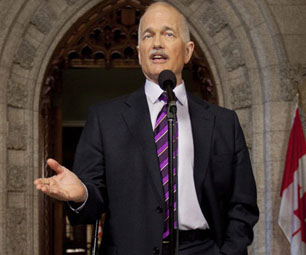
Should Quebec get more seats in the Canadian House of Commons? The Jack of Hearts seems to be saying yes.
The question of Jack Layton’s approach to Quebec’s representation in a slightly reformed Canadian House of Commons, designed to bring the representation of the three most rapidly growing provinces of BC, Alberta, and Ontario more into line with the ancient democratic principle of representation by population, arose this past weekend. And we just want to make one as-quick-as-we-can-manage comment – or plea for clearer thinking.
As the background has been explained by the Toronto Star: “NDP Leader Jack Layton says he won’t let down his new supporters in Quebec and will propose practical measures defending the language and culture of Quebecers … He says the NDP will start by fighting to keep Quebec from losing influence in the House of Commons … Prime Minister Stephen Harper’s government is looking to increase the number of MPs in other provinces where the population has grown quickly … That would reduce the percentage of seats Quebec currently holds, something that has enraged provincial politicians.”
As elaborated on by the CBC website: “The Conservatives proposed in April that Canada’s three fastest-growing provinces should get more seats in the House of Commons by 2014, with Ontario gaining 18 seats, British Columbia gaining seven and Alberta five … Under the proposed legislation, all other provinces, whose populations are not growing as quickly, would be guaranteed to keep the number of seats they have. Quebec currently holds 75 out of 308 seats, 24.4 per cent of seats, despite having 23.2 per cent of Canada’s population.”
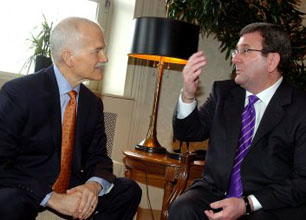
Le chef du NPD, Jack Layton, s'est entretenu avec le maire de Québec, Régis Labeaume, en matinée, lundi 18 avril 2011. LE SOLEIL, JEAN-MARIE VILLENEUVE.
What Mr. Layton is proposing , it seems for the moment at any rate, is some formula that ensures Quebec retains its current percentage of seats in the Canadian House of Commons, by being granted new seats along with BC, Alberta, and Ontario – even though its population has not increased so as to warrant any new seats of this sort. And : “When asked whether Canadians would accept Quebec getting more seats despite already being over-represented in terms of population, Layton said a balance must be struck … ‘We have to represent and recognize in this delicate dance of statecraft some of the other principles that were on the minds of our founders when they set down and laid things out, that striking that balance and having Canadians accept that there need to be some kind of compromise,’ he said.”
We agree with Jack Layton altogether, when he urges that we the Canadian people of the early 21st century “have to represent and recognize in this delicate dance of statecraft some of the other principles that were on the minds of our founders” – especially when it comes to ensuring some form of entrenched long-term recognition of the founding Canadian commitment to the survival and vigor of the French-speaking majority in Quebec. But we also think it is altogether illogical to try to express this recognition in the Canadian House of Commons, which, as we understand the founding principles, is supposed to express the modern democratic principle of representation by population (one person one vote, and all that, etc, etc, etc).
The logical place in which to entrench legislative or parliamentary expression of the founding Canadian commitment to the survival and vigour of the French-speaking majority in Quebec is a reformed Senate of Canada – the institution that the founders did intend to protect various regional interests, as opposed to the interests of the popular electorate from coast to coast to coast. And here again we also note in closing another more recent counterweights article by our colleague Randall White: “NDP (and Liberals) could support Harper’s Bill S-8 on Senate elections, in exchange for provincial representation concept that makes sense for Quebec.”
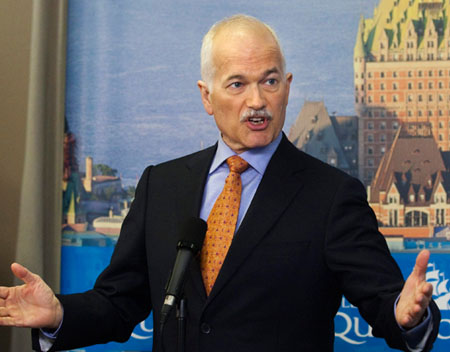
NDP Leader Jack Layton responds to reporters questions at a news conference in Quebec City, Monday, April 18, 2011. (Jacques Boissinot / THE CANADIAN PRESS).
It is all too painfully clear of course that, as logical and potentially creative as using Senate reform as a mechanism to help express Quebec’s particular role in the confederation of the 21st century may be, there are huge roadblocks in the way, flowing from unexamined and increasingly tired old assumptions about the Canadian future, in various strategic quarters.
Dr. White, to take just one very minor case in point, broached the concept of special Quebec representation in a reformed Senate on the Globe and Mail website half a dozen years ago, in response to an argument of the day for just abolishing the Senate from the excellent John Ibbitson. And in a Globe and Mail article on Mr. Harper’s current “step by step” plans for starting Senate reform, at last, just this past Sunday (or Monday, today, if you still crave the printed page), Mr. Ibbitson quite aptly notes that “Many provinces balk at electing senators, who could compete with provincial governments as voices representing regional interests. Quebec especially opposes Senate reform … The NDP wishes to see the Senate abolished.”
(An article in the Toronto Star by the often very astute and compelling Bob Hepburn, just this past Wednesday, also demonstrated the continuing hostile resistance to any kind of creative Senate reform – as opposed to outright abolition – that still haunts many important regions of contemporary Canadian informed opinion.)
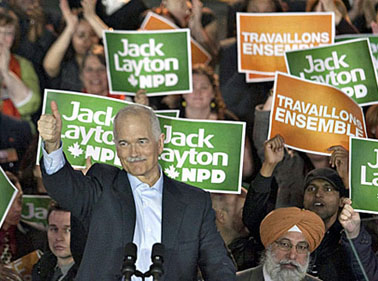
NDP Leader Jack Layton gives the thumbs-up to the largest crowd ever at a rally in the province of Quebec, Saturday, April 23, 2011 in Montreal. (Jacques Boissinot/Canadian Press).
Again, all this just seems to us to underline the extent of the difficulties that face any Jack Layton who seriously aspires to serve as gifted midwife in the rebirth of a fresh and more realistic mainstream Quebec federalism for the 21st century.
To finally come up with something sensible that just might actually work, he must not only change the minds of many others – friend and foe alike. He must also change his own mind, along with at least some sticky traditional views of the party he leads. It is of course no slight on him and the already quite surprising things he has managed to achieve in his political career, to wonder if anyone among us (we the Canadian people) would be equal to such a task?
To end on some positive note, the good news between the lines may nonetheless be that it is still not clear the answer is no one at all. The jack of hearts may yet show that he has a head and a stomach as well. And as recently as two months ago who would have taken at all seriously the prediction that Jack Layton’s New Democrats would win 59 of 75 seats in Quebec!
